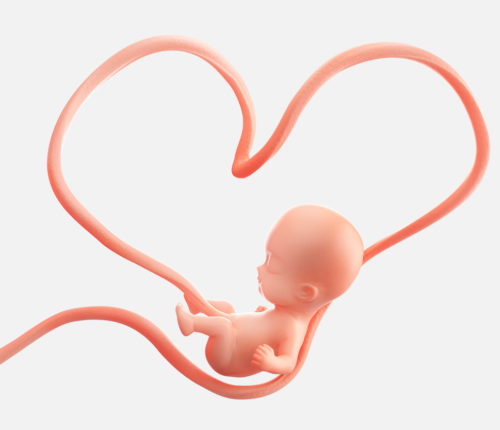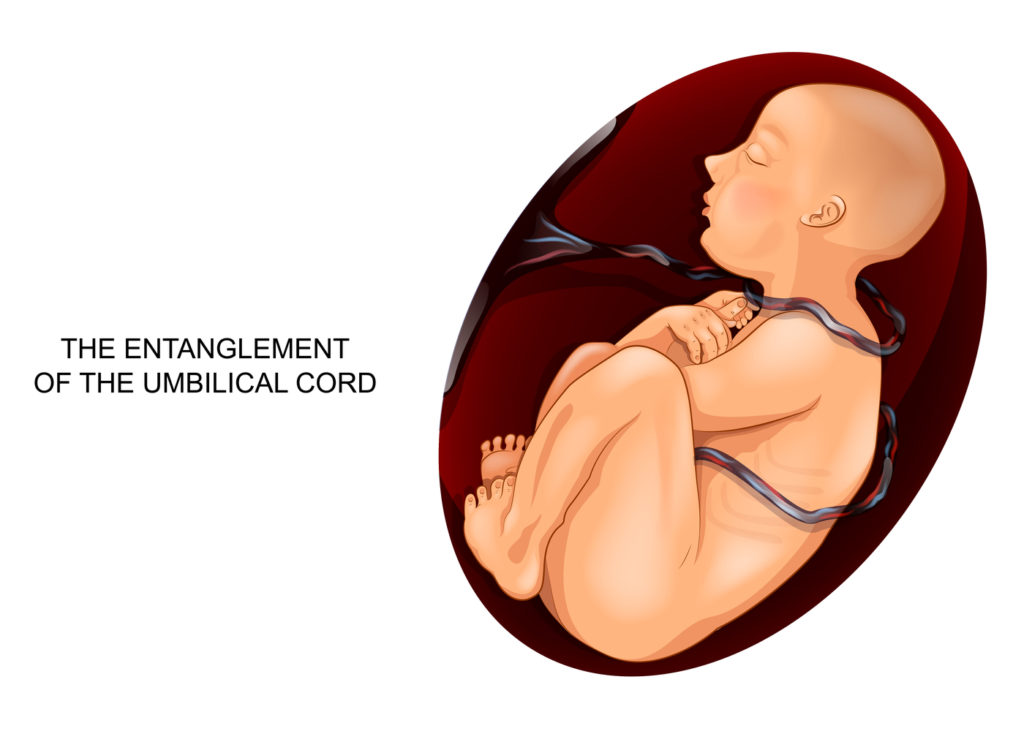
What is a Nuchal Cord Birth Injury?
Expectant parents often hear stories about umbilical cord problems during labor and delivery. The most common umbilical cord problem occurs when the cord gets wrapped around the baby’s neck. This is called a nuchal cord. Doctors often warn parents about this relatively common complication. However, most parents don’t really know what a nuchal cord birth injury is.
Furthermore, most parents are not aware that a nuchal cord can lead to serious medical problems including heart abnormalities and brain damage.
What is a Nuchal Cord?
A nuchal cord is the medical term for what happens when the umbilical cord wraps around the fetus’s neck. The term refers to the “nape” or back of the neck. A nuchal cord occurs when the cord wraps around the neck at a full 360-degrees. A nuchal cord is not the same thing as umbilical cord collapse or prolapse.
Nuchal cords are one of the most common umbilical cord problems during pregnancy. These complications occur in as many as 12 percent of all pregnancies between 24 and 26 weeks. The percentage increases significantly to 37 percent among term babies (39 weeks or more).
What Causes a Nuchal Cord?
Nuchal cords are fairly common, and may result from several different situations. The most common causes of a nuchal cord are:
- Excessive fetal movement
- Weak umbilical cord structure
- An unusually long umbilical cord
- Excessive amounts of amniotic fluid
- Pregnancy with twins or multiples
These are a few of the most common causes of nuchal cords. However, there are many instances where the umbilical cord wraps around the baby’s neck with no obvious cause.
What is a Nuchal Cord Birth Injury?
The umbilical cord is an important part of a developing fetus. The umbilical cord provides oxygen and nutrients to the fetus before delivery. When the umbilical cord wraps around the baby’s neck, there is the potential for a nuchal cord birth injury. While these injuries are relatively uncommon, parents should know that they are a possibility.
A nuchal cord birth injury may include:
- Heart Rate Abnormalities: A nuchal cord can cause a lack of oxygen and blood flow, which may cause heart rate abnormalities. In most cases, abnormalities correct after delivery.
- Brain Damage: If oxygen deprivation due to a nuchal cord is significant, the infant may suffer brain damage. Brain damage resulting from a nuchal cord birth injury may include:
- Seizures
- Developmental delays
- Intellectual disorders
- Motor disorders
- Infant death
If both oxygen and blood flow to the brain are restricted, the infant may have hypoxic ischemic encephalopathy, or HIE. HIE baby’s are more likely to suffer brain dysfunction leading to conditions like cerebral palsy.

Are There Symptoms of a Nuchal Cord Birth Injury?
A nuchal cord generally presents no symptoms during pregnancy. Your doctor may become aware of an umbilical cord problem during an ultrasound, however. Depending on the position of the cord and fetal vital signs, your doctor may decide that no treatment is needed. He or she may also order additional tests to check for fetal distress, reduced movement, etc.
If the fetus is in distress, however, your doctor may decide to take action. Most commonly, fetal distress will result in the doctor ordering a Cesarean (c-section). Continuing with a vaginal delivery when there are umbilical cord problems can be risky for the mother and the child.
Can a Nuchal Cord be Prevented or Treated?
There is currently no way to prevent a nuchal cord. Doctors have no way of identifying pregnancies that may be at risk for such a complication. Furthermore, there is no way to determine whether an umbilical cord will be excessively long or if the fetus will entangle the cord.
Treating a nuchal cord will depend on the situation. As noted previously, if the fetus is in distress, the doctor will likely opt for a c-section. If the nuchal cord is discovered during vaginal delivery, the doctor will leave the cord as-is until the baby is born. Once the baby is delivered, the doctor will loosen the cord and remove it from the baby’s neck.
As a general rule, doctors will not attempt to remove a nuchal cord during labor. Doctors and researchers do not know how removing the cord could impact the health of the baby. It is incredibly important for doctors to respond to umbilical cord problems carefully.
Have Questions About a Nuchal Cord Birth Injury?
If you are an expectant parent and you have concerns about a nuchal cord birth injury, the best thing to do is talk to your doctor. Address your concerns and find out what you can do to help ensure a healthy pregnancy. Be open and honest with your doctor, and never be afraid to ask questions.
If you ever feel like your questions or concerns are not being addressed, consider getting a second opinion. If you experience a birth injury and believe it is the result of healthcare negligence, consider contacting a birth injury lawyer.

